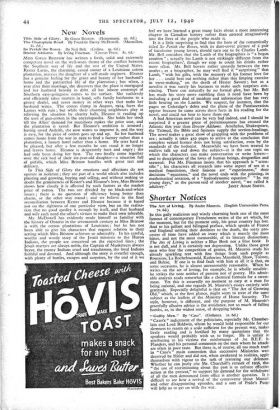Shorter Notices
IN this gaily malicious and wisely charming book one of the most famous of contemporary Frenchmen writes of the art which, for the moment, but for the moment only, his great country has lost. And to his gallant and bilingual preface, which speaks of France and England uniting their destinies to the death, the sorry pro- cesses of time have added an irony which is merely the most bitter, and not the most memorable, of its literary distinctions. The Art of Living is neither a Blue Book nor a blue book. It is not dull, and it is certainly not depressing. Unlike those great men who fear the competition of genius, M. Maurois studs his already sparkling text with fine things from such people as Rousseau, La Rochefoucauld, Katherine Mansfield, Shaw, Tolstoy, and Balzac. If one is to find fault with him at all it is that, on some occasions, he is almost unreasonably reasonable. When he writes on the art of loving, for example, he is wholly sensible: he strikes the note neither of passion nor of poetry. His admir- able analysis reads somewhat like a chemical formula for a sweet- meat. Yet this is assuredly no moment to carp at a man for being rational, and one regards M. Maurois's essays entirely with gratitude. Especially delightful is that on " The Art of Growing Old," which, at the first glance, might seem to treat of the same subject as the leaflets of the Ministry of Home Security. The style, however, is different, and the purpose of M. Maurois's gracefully allusive advice is the avoidance, not so much of falling bombs, as, in the widest sense, of dropping bricks.


























 Previous page
Previous page